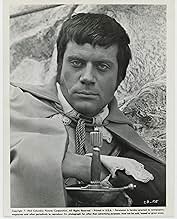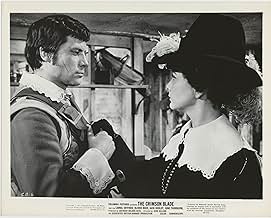In 1648, during the English Civil War, Captain Sylvester switches sides between the Parliamentary and Royalist camps as his interests dictate, while King Charles I is on the run from Oliver ... Read allIn 1648, during the English Civil War, Captain Sylvester switches sides between the Parliamentary and Royalist camps as his interests dictate, while King Charles I is on the run from Oliver Cromwell's troops.In 1648, during the English Civil War, Captain Sylvester switches sides between the Parliamentary and Royalist camps as his interests dictate, while King Charles I is on the run from Oliver Cromwell's troops.
- Nominated for 1 BAFTA Award
- 1 nomination total
Barbara Bennett
- Villager
- (uncredited)
Douglas Blackwell
- Blake
- (uncredited)
Wallace Bosco
- Villager
- (uncredited)
Bill Brandon
- Roundhead Soldier
- (uncredited)
Michael Byrne
- Lt. Hawke
- (uncredited)
Eric Corrie
- Duncannon
- (uncredited)
Peter Diamond
- Soldier
- (uncredited)
- …
- Director
- Writer
- All cast & crew
- Production, box office & more at IMDbPro
Featured reviews
The English Civil War much like our own in America has been fodder for numerous historical adventure stories. And the stories have been told from both the Cavalier and Roundhead sides with each taking turn at being the hero and villain of same. It was that kind of period in the United Kingdom history, subject to many different interpretations on all sides.
In this one the Royalist cavaliers are the heroes, they've been driven underground pretty much in 1648 and are now concerned with rescuing King Charles I and spiriting him away to safe exile. Charles is now in the custody of Colonel Lionel Jeffries and Captain Oliver Reed of Oliver Cromwell's Ironsides army and is on the way to London for trial and execution.
Jeffries has set up headquarters in the manor of the Beverleys who were Royalists now dispossessed of their property. Jeffries is one real pig as I recall and not living the spartan puritan life that his kind were wont to preach about. He's even got a marriage arranged for his daughter June Thorburn to Oliver Reed. But June's a secret Royalist whose heart is set on Jack Hedley the elder of the two Beverley brothers who is leader of an underground group of Royalists.
The intrigue in trying to rescue the King is tangled up with the romantic intrigue of this triangle and it leads to a lot of tragedy all around. History tells us what happened to Charles I, if he ruled rather badly, he certainly died nobly for his cause. As for the personal intrigues, you have to see the film for that.
The Scarlet Blade was playing as the second half of a double bill as I recall, probably with some Hammer horror feature. I remember at the time thinking how much more interesting Oliver Reed was as the shrewd, but villainous Roundhead than Jack Hedley was as the dashing, but rather wooden cavalier. Maybe Thorburn ought to rethink what she's doing. Of course this was before Oliver Reed became an international star, but his appeal was dead-on.
If you get a chance to see The Scarlet Blade, you'll see an average, but entertaining swashbuckler that might have been better with Reed as the hero.
In this one the Royalist cavaliers are the heroes, they've been driven underground pretty much in 1648 and are now concerned with rescuing King Charles I and spiriting him away to safe exile. Charles is now in the custody of Colonel Lionel Jeffries and Captain Oliver Reed of Oliver Cromwell's Ironsides army and is on the way to London for trial and execution.
Jeffries has set up headquarters in the manor of the Beverleys who were Royalists now dispossessed of their property. Jeffries is one real pig as I recall and not living the spartan puritan life that his kind were wont to preach about. He's even got a marriage arranged for his daughter June Thorburn to Oliver Reed. But June's a secret Royalist whose heart is set on Jack Hedley the elder of the two Beverley brothers who is leader of an underground group of Royalists.
The intrigue in trying to rescue the King is tangled up with the romantic intrigue of this triangle and it leads to a lot of tragedy all around. History tells us what happened to Charles I, if he ruled rather badly, he certainly died nobly for his cause. As for the personal intrigues, you have to see the film for that.
The Scarlet Blade was playing as the second half of a double bill as I recall, probably with some Hammer horror feature. I remember at the time thinking how much more interesting Oliver Reed was as the shrewd, but villainous Roundhead than Jack Hedley was as the dashing, but rather wooden cavalier. Maybe Thorburn ought to rethink what she's doing. Of course this was before Oliver Reed became an international star, but his appeal was dead-on.
If you get a chance to see The Scarlet Blade, you'll see an average, but entertaining swashbuckler that might have been better with Reed as the hero.
This Hammer swashbuckler is one of the few films to be set during the English Civil War. Unfortunately, its treatment of the conflict is fairly simplistic ; the Roundheads are the baddies, intent on killing the king, and the Cavaliers are the romantic good guys, led by Jack Hedley, looking slightly too old to play the Robin Hood like hero.
The film suffers from the fact that the "villains" (Lionel Jeffries, Oliver Reed) are much more charismatic than the "heroes" (Hedley and an insipid June Laverick). The downbeat ending is also a surprise. Nevertheless, like most Hammer films, it is well-mounted and richly-photographed by Jack Asher. Watch out for the sequence in which the outlaws, disguised as bushes (!), creep ever-closer to the Roundhead guards. It looks like a scene from Monty Python!
The film suffers from the fact that the "villains" (Lionel Jeffries, Oliver Reed) are much more charismatic than the "heroes" (Hedley and an insipid June Laverick). The downbeat ending is also a surprise. Nevertheless, like most Hammer films, it is well-mounted and richly-photographed by Jack Asher. Watch out for the sequence in which the outlaws, disguised as bushes (!), creep ever-closer to the Roundhead guards. It looks like a scene from Monty Python!
This was the first Oliver Reed film I ever saw and it's still one of my favourites. He gives an impressive early performance in this good Hammer production. The downslide of it is the main character, played by Jack Hedley, who is a bad actor. One to watch for any Oliver Reed fan.
Set during the English Civil War director John Gilling delivers standard historical fare for Hammer Films as we see the Roundheads kidnap King Charles I, led by unscrupulous Lionel Jeffries and side kick Oliver Reed, only to be scuppered by his own daughter, beautifully played by June Thorburn.
These 3 actors are the best thing about the piece, the Scarlet Blade himself played by Jack Hedley is a rather bland swashbuckling hero who comes to save the day but has none of the charisma of a Robin Hood.
Like most Hammer productions it is handsomely photographed with nice sets and costumes to evoke the period whilst making the most of the English countryside but a lot of it is obviously done in a studio on a very low budget which limits it's scope. The pacing is slow and methodical and it requires patience to sit through but for Hammer purists it's well worth a visit to 1648.
These 3 actors are the best thing about the piece, the Scarlet Blade himself played by Jack Hedley is a rather bland swashbuckling hero who comes to save the day but has none of the charisma of a Robin Hood.
Like most Hammer productions it is handsomely photographed with nice sets and costumes to evoke the period whilst making the most of the English countryside but a lot of it is obviously done in a studio on a very low budget which limits it's scope. The pacing is slow and methodical and it requires patience to sit through but for Hammer purists it's well worth a visit to 1648.
Set during the civil war with the Roundheads portrayed as the baddies and the Royalists the dashing heroes. Some of the scenes are quite well shot and it's in Technicolor as well which is a plus.
Unfortunately, the heroes aren't very interesting and are overshadowed by the much better Oliver Reed and Lionel Jeffries, the heroes aren't even that likeable and June Thorburn's character is just downright nasty and annoying, she doesn't deserve anyone. Reed's character is by far the most well done and complex, he does a fine acting job too. Additionally, for an action film there's a notable lack of action and the fighting that is in is not very well choreographed or entertaining.
3/10: Worth a watch for Oliver Reed but as a swashbuckler is terrible
Unfortunately, the heroes aren't very interesting and are overshadowed by the much better Oliver Reed and Lionel Jeffries, the heroes aren't even that likeable and June Thorburn's character is just downright nasty and annoying, she doesn't deserve anyone. Reed's character is by far the most well done and complex, he does a fine acting job too. Additionally, for an action film there's a notable lack of action and the fighting that is in is not very well choreographed or entertaining.
3/10: Worth a watch for Oliver Reed but as a swashbuckler is terrible
Did you know
- TriviaReleased as a double bill with The Son of Captain Blood (1962) in the United Kingdom.
- GoofsThe woods are full of Rhododendrons, a bush not introduced to Great Britain from the Himalayas until the late 18th century - 150 years after the Civil War.
- Quotes
Capt. Tom Sylvester: [to Claire Judd] I love you even more when you're angry. It does something for your complexion.
- Crazy creditsOpening credits prologue: 1648 This is the story of a band of freemen who defied a tyrant.
- ConnectionsFeatured in Without Walls: The Obituary Show - Oliver Reed (1993)
Details
- Release date
- Country of origin
- Language
- Also known as
- Die scharlachrote Klinge
- Filming locations
- Production companies
- See more company credits at IMDbPro
- Runtime
- 1h 23m(83 min)
- Aspect ratio
- 2.35 : 1
Contribute to this page
Suggest an edit or add missing content


































